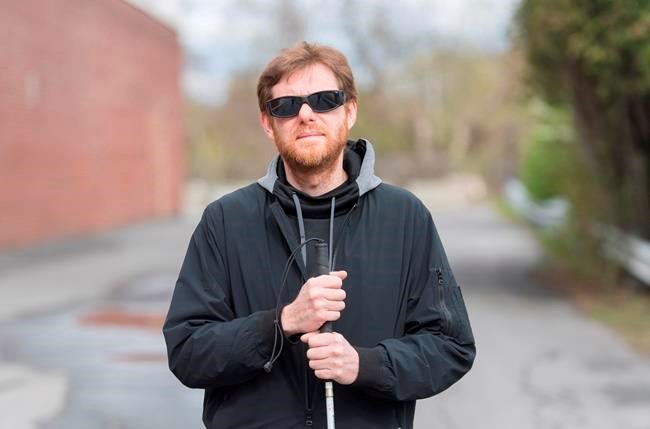The physical distancing rules put in place across Canadian society are supposed to shield everyone from the ravages of COVID-19, but Nick D'Ambrosio doesn't feel protected.
Maintaining a two-metre distance from members of the public is a challenge for the 49-year-old, who has lost most of his eyesight and now travels with a white cane.
Neither that mobility aid nor his remaining vision are up to the task of keeping him at a safe distance from others, either in the Montreal-area drug store where he's stocked shelves for 22 years or while running essential errands further afield.
Other potentially protective measures — such as the widespread distribution of hand sanitizer dispensers or the installation of floor markers intended to manage crowds in public spaces — also leave him and other Canadians living with vision loss on the margins, D'Ambrosio said. Sometimes the only way to locate the new additions involves soliciting sighted assistance from strangers — thereby further increasing exposure to the novel coronavirus.
D'Ambrosio said he's fortunate to have supportive colleagues and loved ones who help mitigate his personal risk, but the additional barriers add another dimension of anxiety for blind Canadians navigating an already troubling time.
"I've been scared for a good portion of my life and I don't want to be scared anymore," D'Ambrosio said in a telephone interview. "But does the anxiety linger in me at times? I'd be lying to you if I say no."
While the ravages of COVID-19 are being felt across all of society, a growing chorus of voices has been sounding the alarm about the virus's impact on people with disabilities around the world.
Earlier this month, United Nations Secretary General Antonio Guterres called for governments to place greater focus on the unique needs of their disabled citizens.
"People with disabilities are among the hardest hit by COVID-19," Guterres said in a statement. "They face a lack of accessible public health information, significant barriers to implement basic hygiene measures, and inaccessible health facilities. If they contract COVID-19, many are more likely to develop severe health conditions, which may result in death."
Canadians living with vision loss are among those feeling a disproportionate impact from both the virus and the measures meant to protect against it, according to a recent survey commissioned by the Canadian Council of the Blind.
The online questionnaire, surveying more than 500 blind, partially sighted and deafblind Canadians, identified myriad concerns involving nearly all facets of everyday life.
Nearly half the respondents said they did not feel safe when leaving their home since the pandemic began, largely due to difficulties observing physical distancing protocols or failure of the able-bodied population to maintain a safe distance. Other concerns included the accessibility of COVID-19 testing sites, the ability to use public transit safely, heightened economic vulnerability and the increased toll that social isolation will take on mental health.
Council President Louise Gillis said blind Canadians have even been subjected to public scorn, being "hollered at" for inadvertently running afoul of public health measures that are inherently difficult for them to observe.
In nearly every case, she said, the community's fears stem from pre-existing systemic issues now exacerbated by COVID-19.
"We seem to be more vulnerable when something happens," she said.
For Penny Leclair, who is deafblind, vulnerability comes from an increased sense of isolation and the withdrawal of key social supports over the course of the pandemic.
The 68-year-old North Bay, Ont., resident said she feels excluded from many of the workarounds most of society is turning to for social connection, such as video conferencing and other platforms that rely on sound and sight.
She's also cut off from the intervener services she relied on before the outbreak, since they've been scaled back and concentrated on people living alone.
Delegating all outside tasks to her husband, she said, has left her wrestling with both a loss of independence and powerful feelings of isolation.
"For deafblind people, touch is a must and dependence on an intervener is a part of life — not social," Leclair said in an email interview. "The intervener is not just a family support person, they are eyes and ears for deafblind people."
For Barbara Amberstone, a legally blind Indigenous elder living in Victoria, the greatest frustration comes from proposed coping solutions that she said leave large swaths of the community on the margins.
Most efforts to respond to COVID-19 have involved the use of technology, she said, noting everything from reading government information to maintaining social connection depends on an internet connection and accessible hardware and software. Such reliance on tech is further entrenched in the vision loss community, she added.
But Amberstone said those who can't afford or access the technology, including those living in poverty or remote parts of the country, are now coping with an additional layer of isolation on top of those already imposed by the pandemic.
"It's so privileged," Amberstone said of the national response. "There's so much that poor people and disabled people are left out of."
The council report found public awareness and more effective messaging from all levels of government are needed to limit the effects of COVID-19 and its aftermath on the vision loss community.
D'Ambrosio agrees, saying the unique challenges he and his peers all face can't be ignored forever.
"Right now we're at the very early stages and things are changing daily," he said. "So I don't know if this is the new norm, I don't know if this will persist ... but eventually our rights will have to be heard."
This report by The Canadian Press was first published May 17, 2020.
Michelle McQuigge, The Canadian Press



